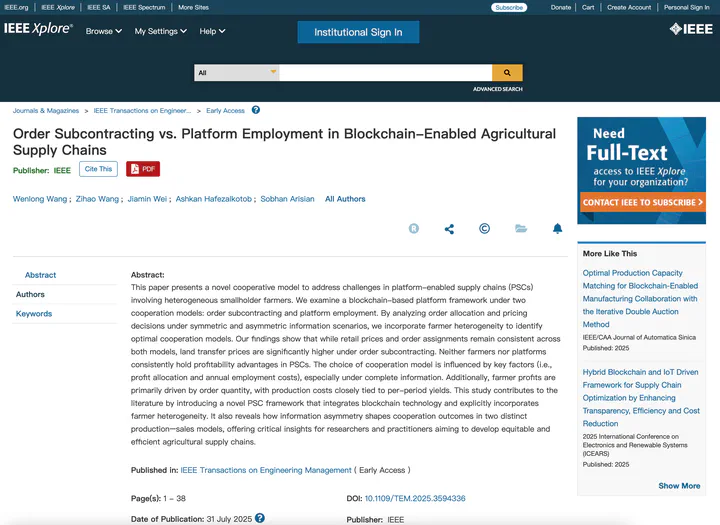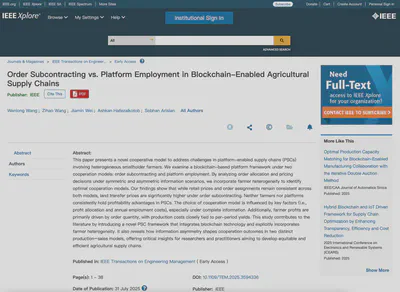Order Subcontracting Versus Platform Employment in Blockchain-Enabled Agricultural Supply Chains
 Webpage screenshot
Webpage screenshot
摘要
In this article, we present a novel cooperative model to address challenges in platform-enabled supply chains (PSCs) involving heterogeneous smallholder farmers. We examine a blockchain-based platform framework under two cooperation models: order subcontracting and platform employment. By analyzing order allocation and pricing decisions under symmetric and asymmetric information scenarios, we incorporate farmer heterogeneity to identify optimal cooperation models. Our findings show that while retail prices and order assignments remain consistent across both models, land transfer prices are significantly higher under order subcontracting. Neither farmers nor platforms consistently hold profitability advantages in PSCs. The choice of cooperation model is influenced by key factors (i.e., profit allocation and annual employment costs), especially under complete information. In addition, farmer profits are primarily driven by order quantity, with production costs closely tied to per-period yields. This study contributes to the literature by introducing a novel PSC framework that integrates blockchain technology and explicitly incorporates farmer heterogeneity. It also reveals how information asymmetry shapes cooperation outcomes in two distinct production–sales models, offering critical insights for researchers and practitioners aiming to develop equitable and efficient agricultural supply chains.
类型
出版物
IEEE Transactions on Engineering Management, 72, 3499-3517

介绍
本研究发表在工程管理领域的ABS 3期刊IEEE Transactions on Engineering Management。该研究探讨了基于区块链的平台平台供应链,并考虑了两种合作模式:订单分包模式和平台雇佣模式。通过纳入农民异质性,分析对称和不对称信息情境下的订单分配和定价决策,以识别最佳合作模式。
下面是摘要的中文翻译
在本文中,我们提出了一种新颖的合作模型,以应对涉及异质小农户的平台驱动供应链(PSC)中的挑战。我们考察了基于区块链的平台框架,研究了两种合作模型:订单分包和平台雇佣。通过分析在对称和非对称信息情境下的订单分配和定价决策,我们结合农户异质性以识别最佳合作模型。我们的研究结果表明,尽管零售价格和订单分配在两种模型中保持一致,但在订单分包下,土地转让价格显著更高。在PSC中,农户和平台均未能始终保持盈利优势。合作模型的选择受到关键因素(即利润分配和年度雇佣成本)的影响,特别是在完全信息的情况下。此外,农户的利润主要受订单数量驱动,生产成本与每期产量密切相关。本研究通过引入一种结合区块链技术并明确考虑农户异质性的创新PSC框架,丰富了相关文献。同时,它揭示了信息不对称如何影响两种不同生产-销售模型中的合作结果,为旨在开发公平高效的农业供应链的研究人员和从业者提供了重要见解。